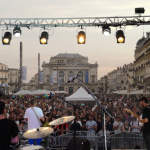The summer solstice, which this year takes place on June 21 in France, marks the official start of the astronomical summer season. It's also thelongest day of the year, an occasion marked by the Fête de la Musique and many other traditions. The exact time of the solstice is 4:57 pm, according to the Institut de mécanique céleste et de calcul des éphémérides.
This is an important day in astronomy. The term solstice comes from the Latin "sol" meaning sun and "sistere" meaning to stop. This reflects the slowest-growing daylight period at this time of year. This astronomical phenomenon takes place when the sun is furthest from the equator, coinciding with the maximum period of daylight on Earth in the northern hemisphere. It's also interesting to note that the length of daylight is not the same everywhere; at the Arctic Circle, the sun hardly sets at all.
It's also important to note that, contrary to popular belief, the summer solstice doesn't always fall on June 21. This is due to the Gregorian calendar and variations in the Earth's orbit around the Sun. In the 20th century, for example, the solstice occurred 64 times on June 21 and 36 times on June 22.
This day is not only significant from an astronomical point of view, but is also rich in tradition. In France, of course, there's the Fête de la Musique , but there's also an older celebration known as the Fête de la Saint-Jean, which dates back to antiquity. It honored the summer season, inspired by the cult of the sun, and was taken over by the Catholic Church to become a festival of light.
The root of the word "summer" comes from the classical Latin"aestatem", meaning "the time of heat".
Some interesting facts:
Finally, a historical anecdote: legend has it that Galileo Galilei was sentenced to life imprisonment for maintaining that the Earth revolves around the Sun. Indeed, it was on this symbolic day, the summer solstice of 1633, that this genius astronomer was condemned by the Inquisition for supporting heliocentrism, the theory that the Earth revolves around the Sun. This decision by the Inquisition marked a major turning point in the history of science.
Today, almost 400 years later, the summer solstice is also a day on which the scientific community and the general public commemorate Galileo's courage. His work and observations, which went against the convictions of the time, laid the foundations of modern science.
Every year, special events and ceremonies are held around the world to celebrate Galileo's legacy during the solstice. Museums, universities and scientific institutions open their doors to astronomy and history enthusiasts. In Galileo's native Florence, an international symposium featured astronomers and historians discussing the impact of his discoveries on contemporary science.
To complete this journey into the history and science of the solstice, it's important to remember that the days following the solstice see a gradual decrease in the duration of sunshine in the northern hemisphere. It's a reminder of the importance of enjoying the present moment and celebrating the knowledge and discoveries that help us better understand our place in the universe.
In conclusion, whether listening to music in the busy streets, watching a majestic sunset, or delving into the history of science and astronomy, the summer solstice is a day rich in tradition and knowledge. Let's celebrate the longest day of the year by paying homage to the Earth, the Sun, and to the courageous minds like Galileo who lit our path to understanding the mysteries of the cosmos.
Happy summer solstice to all!
Did you know? What is the origin and history of the Fête de la Musique?
Why is the Fête de la Musique celebrated on June 21? Who created the Fête de la Musique, where did it take place and when was the first edition? These are just some of the questions that deserve to be asked about the origins of the festival, and its history. [Read more]



 Did you know? What is the origin and history of the Fête de la Musique?
Did you know? What is the origin and history of the Fête de la Musique?














